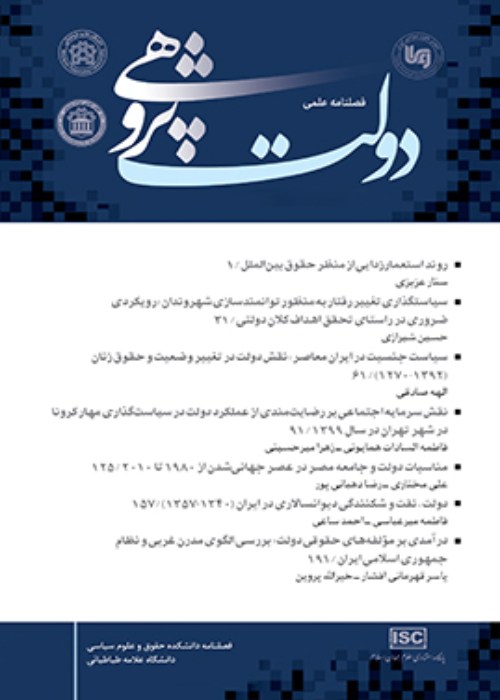Political Development of the State in South Korea
Author(s):
Abstract:
Purpose
The East Asian region includes countries that mostly became independent after the Second World War and were established as newborn countries. Although the traditions of governance in most of these countries are as long as history, these nation-states have followed the policies of political development as a part of their developmental policies in general during the last decades. While the Western models of development offered a typical pattern for developing political institutions, the East Asian countries, however, have applied their own models of political development in the political structures of their societies. These models are mostly rooted in the Oriental traditions of governance, and they construct a political identity for the citizens, agents and political elites based on cultural and social values.The main purpose of this research is to analyze the model of political development of the state in South Korea based on political development theories. The question is how South Korean policy-makers have made a unique model of development based on cultural, social, economic and political heritages of this country.
Design/Methodology/Approach: The author will also examine the level of political development of the state in this country based on the criteria of classical theories of political development, such as the role of political elites, urbanization, literacy level, sociocultural features, the economic situation, foreign pressures and the like.
Findings: One of the most important elements that played a key role in shaping the political structure of government in South Korea is regionalization of politics in this country. The author has tried to explain the impact of this phenomenon in the process of political development of the state in South Korea.
Another factor, which has a certain degree of influence on the political culture of the South Korean society, especially among political activists and policy-makers, is the teachings of Confucius. As the mentor of millions of East Asian people, Confucius argues that people should obey the governors and the rules must be responsible for bringing peace and stability to the society. This idea was accepted by many rulers throughout history and prepared a suitable ground for creating semi-authoritarian states ruling over this region for centuries. Still, we can witness the impact of such an approach on the South Korean society. In fact, the influence of the political traditions of governance in the South Korean society is undeniable.
The impression of political competitions between the East and the West blocs during the Cold War and the South Korean tendency toward the Western bloc is also evident in the political development policies of the state in this country.
Value: Regarding the above-mentioned elements, the author argues that the historical features and political culture of the South Korean society have played an important role in the foundation of the structure of political development of the state in this country.
Keywords:
Language:
Persian
Published:
Studies the State, Volume:2 Issue: 6, 2016
Pages:
39 to 59
magiran.com/p1591115
دانلود و مطالعه متن این مقاله با یکی از روشهای زیر امکان پذیر است:
اشتراک شخصی
با عضویت و پرداخت آنلاین حق اشتراک یکساله به مبلغ 1,390,000ريال میتوانید 70 عنوان مطلب دانلود کنید!
اشتراک سازمانی
به کتابخانه دانشگاه یا محل کار خود پیشنهاد کنید تا اشتراک سازمانی این پایگاه را برای دسترسی نامحدود همه کاربران به متن مطالب تهیه نمایند!
توجه!
- حق عضویت دریافتی صرف حمایت از نشریات عضو و نگهداری، تکمیل و توسعه مگیران میشود.
- پرداخت حق اشتراک و دانلود مقالات اجازه بازنشر آن در سایر رسانههای چاپی و دیجیتال را به کاربر نمیدهد.
In order to view content subscription is required
Personal subscription
Subscribe magiran.com for 70 € euros via PayPal and download 70 articles during a year.
Organization subscription
Please contact us to subscribe your university or library for unlimited access!


